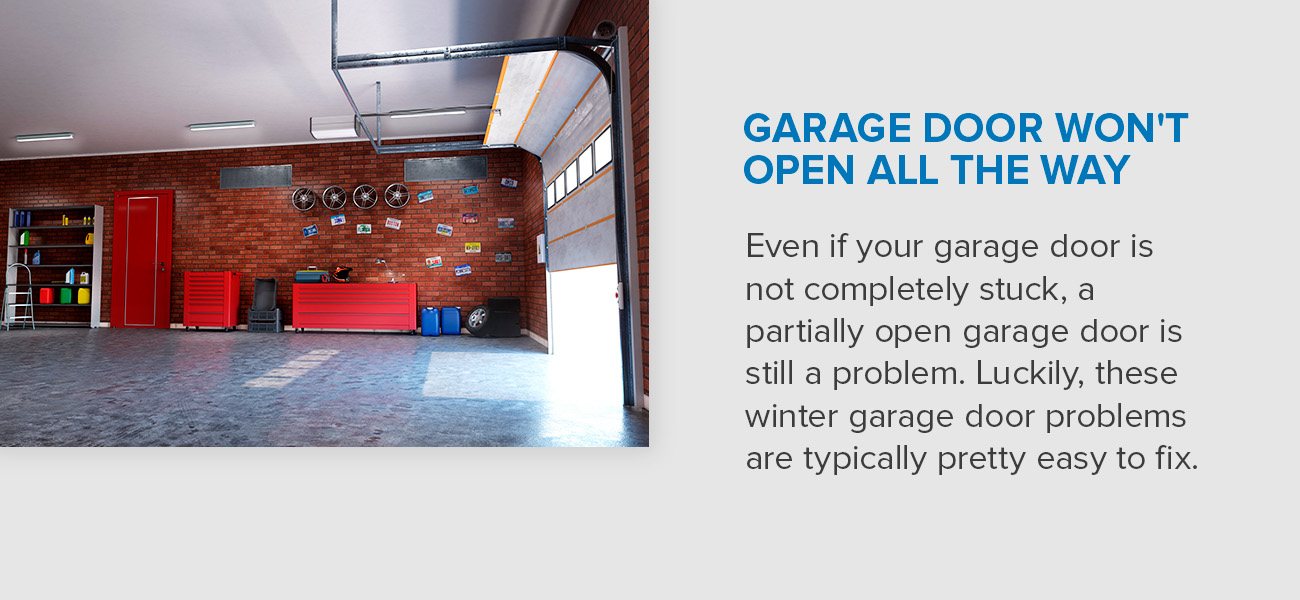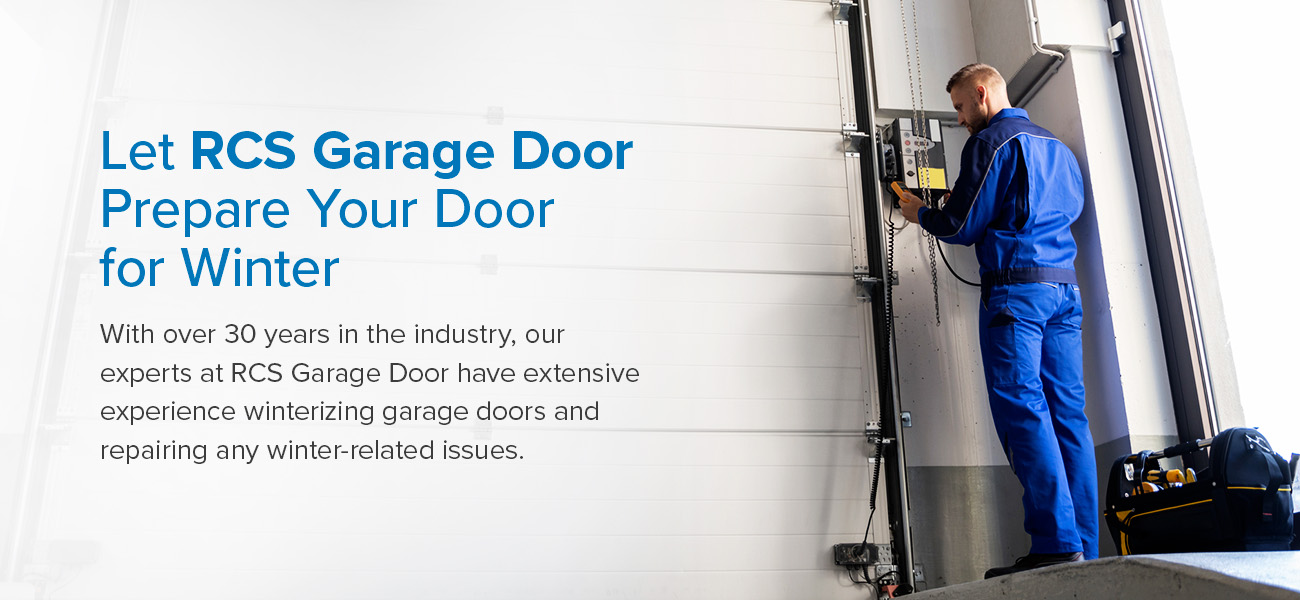Garage Door Opener Cold Weather Problems
Winter can be tough on your home. If you don’t take the proper precautions to prepare for the weather, the repercussions can be costly and, in some cases, dangerous. Winterizing the parts of your property that are vulnerable to colder temperatures is an annual necessity, and your garage door is no exception. When the temperature drops, you may find yourself stuck out in the cold if you’ve failed to maintain your garage door.
Here are a few common garage door issues that cold weather can cause and how you can diagnose and resolve them.
Garage Door Won’t Open
This issue is common in the winter. The culprit of your garage door failure is most likely one of three things. Either your opener has quit working, your garage door has frozen to the ground or you have a broken spring.
Opener Won’t Work
The quickest way to find out if your opener is causing the issue, is to disconnect the door from the opener and attempt to lift the door manually. If you can lift the door after disconnecting it, the problem most likely relates to your opener.
Check to make sure your opener remote has fresh batteries and nothing is tripping the sensors, reconnect the door and try again. If the issue persists, contact your local experts at RCS Garage Doors for help further diagnosing it. Maintaining the warranty on some openers requires professional service. If you choose to work on your opener yourself, always do so with the garage door in the closed position.
Garage Door Is Frozen Shut
So you disconnected your door from the opener, and it still won’t budge. Sometimes, cold temperatures can cause cracks in your weatherstripping, ruining its airtight seal and letting water or snow in. As the water freezes, your door will become frozen to the ground. To free the door, you can gently chip away at the ice or use warm water to speed up the melting process.
Do not try to force the door open. Doing so could damage the weatherstripping, hampering your garage doors insulation efficiency. You don’t want a stuck garage door and a high electricity bill. Also, do not use a chemical deicer, especially on metal doors. If you do, you can severely harm your door, leading to more costly repair bills down the road.
If your door still doesn’t open after you’ve melted the ice on your weatherseal, check the panels. Rain or other moisture may have gotten between these panels, causing them to freeze together. You’ll need to apply heat to melt the ice. However, remain patient, as heating the panels too quickly or aggressively may damage the metal.
Once your garage door is finally open, routinely check the area for any puddles or snow or ice buildup and remove them as soon as possible to prevent your door from freezing shut again.
Broken Spring
If your garage door won’t open manually, or it feels extremely heavy when you do so, you most likely have a broken spring. Unfortunately, broken springs are common in the colder months as the metal becomes weaker and more brittle when the temperature drops. On most garage doors, the spring runs horizontally across the top of the door frame. If it looks like you have two separate springs, you have a broken spring.
Most garage door springs have a life span of seven to 10 years. Depending on how often you use your garage, it’s a good rule of thumb to have your spring inspected annually. If you suspect you have a broken spring, contact RCS Garage Doors. Spring repair can be dangerous and requires professional attention.
Garage Door Won’t Open All the Way
Even if your garage door is not completely stuck, a partially open garage door is still a problem. Luckily, these winter garage door problems are typically pretty easy to fix. Try the practical solutions listed below, and if you still have issues, feel free to reach out to a trusted garage door maintenance and repair company.
Warped or Contracted Metal Parts
During cold weather, metal contracts. This contraction can affect your garage door’s tracks, screws, springs or any other metal component. A sudden drop in temperature or minimal usage of your garage door can also make these contractions worse. A garage door suffering from warped metal will have increased friction, making it harder for the door to properly and fully open or close.
If you believe warped or contracted metal is your issue, it’s a best practice to lubricate all the moving metal parts with a silicone-based lubricant. When applying the lubricant, avoid putting it on the tracks or nylon rollers. Instead, focus on the springs, bearing plates, hinges and metal rollers.
Lubricant Issues
If your door only opens partially or opens and closes much slower than usual, you may have a lubricant issue. Some lubricants lose their effectiveness when the temperature dips below freezing, causing them to harden and clump up and hindering your garage door’s ability to open smoothly. To fix the issue, clean the tracks and rollers with degreaser. Once clean, opt for a silicone-based lubricant for better performance in colder temperatures. Please note that you should only use lubricant on metal garage door parts. Nylon rollers do not require lubrication and applying it may cause damage.
Blocked Safety Sensors
Sometimes it’s not your garage door itself that is having problems. You may find all you need to get your garage door back to normal is to check your safety sensors. Safety sensors tell your door when something is in its path and will stop the door from moving any further. These sensors detect obstructions that block their infrared beam.
During the winter months, especially in areas with fluctuating temperatures, condensation can form on your sensors. This condensation acts as an obstruction in the infrared beam’s path. So, even though there is nothing in the way, your sensors will think there is an obstruction in the door’s path and prevent it from closing or opening. If your garage door sensors don’t work in cold weather, give your sensors a thorough wipe, and your door should be good to go.
Let RCS Garage Door Prepare Your Door for Winter
With over 30 years in the industry, our experts at RCS Garage Door have extensive experience winterizing garage doors and repairing any winter-related issues. If you’re not sure your garage door is ready for winter, peace of mind is just a click away! Contact your local garage door professionals at RCS Garage Door to schedule an inspection and learn what your garage door needs to stay safe and functional this winter.


 Register My Door
Register My Door

